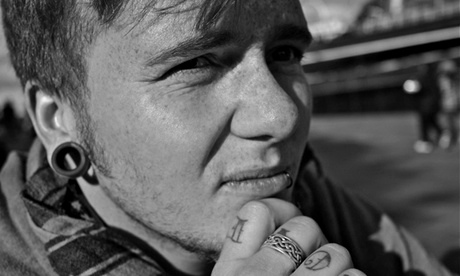
I get up around 6am for breakfast and grab some fruit and natural yoghurt, then begin responding to emails, usually from people asking questions on issues of transgender health and inclusion. I’m a caseworker and the co-lead on service development at cliniQ – the UK’s only trans-led sexual health and wellbeing clinic, and also a member of ReShape, an independent sexual health thinktank. The work is unique, and understandably people tend to ask a lot of questions!
After I’ve cleared my inbox, I’ll head to the gym for an hour or so, before travelling down to New Cross in south-east London. I’m in my final year studying social work at Goldsmiths, which has been really useful in helping me to approach public health from a social justice perspective. At the same time as studying, I’m balancing phone calls and emails, providing consultancy work to various organisations. In recent years there has been a huge increase in visibility of gender variant people, and although there is still a lot of work to be done, with many uphill struggles, it feels like a very exciting time to be involved in trans issues.
Lunch is often a strong coffee, with something light to eat, and consumed on the run, as afternoons consist of more lectures, facilitating support groups, or HIV testing. It’s varied work, which takes me all over London. I really enjoy the mix of working directly with people, and being involved in numerous projects at a strategic level.
In the evenings, I focus on cliniQ, a holistic sexual health and wellbeing service for trans and gender variant people and their partners, which operates from 56 Dean Street in Soho. It’s a unique partnership between the trans communities, voluntary sector organisations and the Chelsea and Westminster hospital NHS foundation trust. The service runs every Wednesday evening. I often spend time during the rest of the week working with my friend and colleague Michelle and our team, to review, develop and improve our services.
As well as development and casework, my role at cliniQ is to provide culturally appropriate triage services. When new patients come in, we talk through how the service can work best for them; we discuss what name and pronouns they’d like us to use, and how we can refer to their body in a way that feels authentic and comfortable, as well as discussing which services they would like to access. We find that involving members of the trans communities in the triage process provides a level of safety rarely found in mainstream services. One patient told us, “I feel like I’ve found something I’ve been looking for, for a long time.”
As well as sexual health, we offer non-clinical services including peer mentoring, counselling, support around substance use and housing advice. It’s not uncommon for someone to come in for their chlamydia treatment then leave having received not only that, but assistance with a job application or advice on how to change their name. Conversely, people often come into see us for therapeutic support, and leave having had a full sexual health check-up or liver function test.
CliniQ is a radical service in a lot of ways; we embody the ethos of “nothing about us, without us” and are a working example of how trans people are not just passive recipients of services, but service providers; we are therapists, social workers, clinicians and researchers. One of the highlights of working at cliniQ (aside from the amazing people who use our services) is the incredible team of people I work with. It wouldn’t be unusual for us to head to Blacks Club on Dean Street after the clinic, to catch up on life outside of cliniQ and unwind with a drink or two before I take the tube back up to Finsbury Park, and home.
My final thoughts for the day are often a reflection on my earlier interactions. There can be a lot of resistance and discrimination when providing services for the trans communities, but the positive responses we get from people who use our services often far outweigh the obstacles we have to overcome.
If you would like to feature in our Day in the Life series, or know someone who would, email socialcare@theguardian.com
The adult social care hub is funded by Liverpool city council and Liverpool clinical commissioning group. All content is editorially independent except for pieces labelled advertisement feature. Find out more here.
Why not join our social care community? Becoming a member of the Guardian Social Care Network means you get sent weekly email updates on policy and best practice in the sector, as well as exclusive offers. You can sign up – for free – online here.

